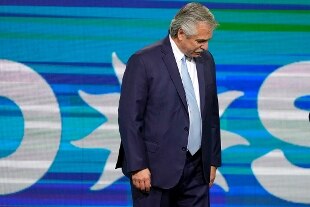The president of Argentina, Alberto Fernandez
Political elections in Argentina, high turnout
Argentina: political elections, unfavorable climate for the government
Share
November 15, 2021 The final result published last night confirmed that in Argentina the government failed in the mid-term legislative elections to overturn the negative results obtained in the 'primary' in September.
Despite having limited the damage in the province of Buenos Aires, the Frente de Todos (Fdt) party recorded negative results throughout the national territory, and now President Alberto Fernandez has a difficult scenario in the last two years of government, before the expiry of the his term in 2023.
The figures released by the National Electoral Chamber show that Juntos por el Cambio (Jxc, center-right opposition) obtained 42.19% of the votes, against 33.83% of the Fdt (center-left). This determines that from December the formation of a parliamentary majority will be more complex, because the Fdt has lost the majority in the strategic 72-member senate, obtaining 35 seats, against 31 for the center-right.
In the chamber (257 seats) the ruling party managed to remain the first party with 118 seats, against 116 in the opposition, while other formations will control the remaining 23 seats.
Clarin, the main Argentine newspaper, today underlined the victory of the opposition, recalling that since the return to democracy in 1983, Peronism "had never lost control of the Senate". For its part, Page 12, close to the government, publishes a cartoon of a little man who climbs a mountain with a stick where an arrow points to 2023, with the title 'uphill'.
In a recorded message Fernandez stressed that he had to face two serious problems, "the economic crisis, inherited from the previous government and the health crisis" due to the Covid-19 pandemic.
"The second part of our government begins," he added, while the economy "is growing". "I intend to promote - he concluded - a constructive dialogue", hoping to be able to count on "an opposition that is responsible and open to dialogue".
Therefore, circumstantial alliances will be necessary to be able to vote on the main reforms envisaged by Fernandez, whose period of government expires in 2023. An instability that could have direct effects on the negotiations that the Minister of Economy, Martin Guzmán, maintains with the Monetary Fund International, on the payment of the $ 44 billion debt contracted in 2018 by the Macri administration.
The agreement must be reached by March, and according to Argentine legislation, parliamentary approval is required.
Precisely for this reason, President Fernandez appeared in the night in a message to unified networks to announce that during the first week of December, a few days before the hiring of the deputies and senators elected yesterday, he will send a bill to approve the policy in extremis economic policy for the next two years which also includes the terms of the agreement with the IMF.

